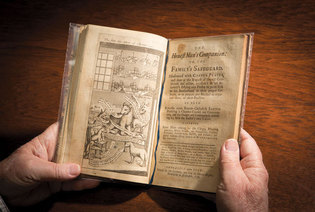 loading
loading
Light & VerityLegal history trove comes to YaleA celebrated collection includes a fourteenth-century Magna Carta.  Harold ShapiroView full imageTwo hundred volumes take up surprisingly little space in the Law School’s rare book section. But they help tell the big story of “our English heritage,” says rare book librarian Mike Widener. The books are part of a newly acquired collection that Widener calls “a superb resource for English social history as well as English legal history.” They were purchased this year from collector Anthony Taussig, at the same time the Beinecke Rare Book and Manuscript Library bought the London barrister’s entire trove of English law manuscripts—a celebrated collection so vast that its catalogue is a 351-page hardcover book. One prize: an “abridgment of statutes” from 1481 or 1482, possibly the first-ever printed book of English law. It’s written in “law French,” with wooden covers and no title page. Other treasures relate to William Blackstone, the eighteenth-century English judge whose multivolume legal commentary is “the single most influential book in the history of Anglo-American common law,” Widener says. In law school–deprived antebellum America, “most of the legal profession was self-taught: they read Blackstone.” Taussig sold Yale a book that belonged to Blackstone himself, as well as a volume of the Oxford lectures that became his commentaries, with handwritten notes by a lecture attendee. Taussig writes in an e-mail that many books and manuscripts were hard to part with, including “the most beautiful book [and] my first serious purchase: a tiny fourteenth-century edition of Magna Carta.” Taussig chose to sell to Yale, he writes, because he wanted “an institution with an existing stock of comparable manuscripts and the related printed law books, and also a tradition of scholarship in the field of English legal history. There are few such institutions—and one of them is Yale.”
The comment period has expired.
|
|